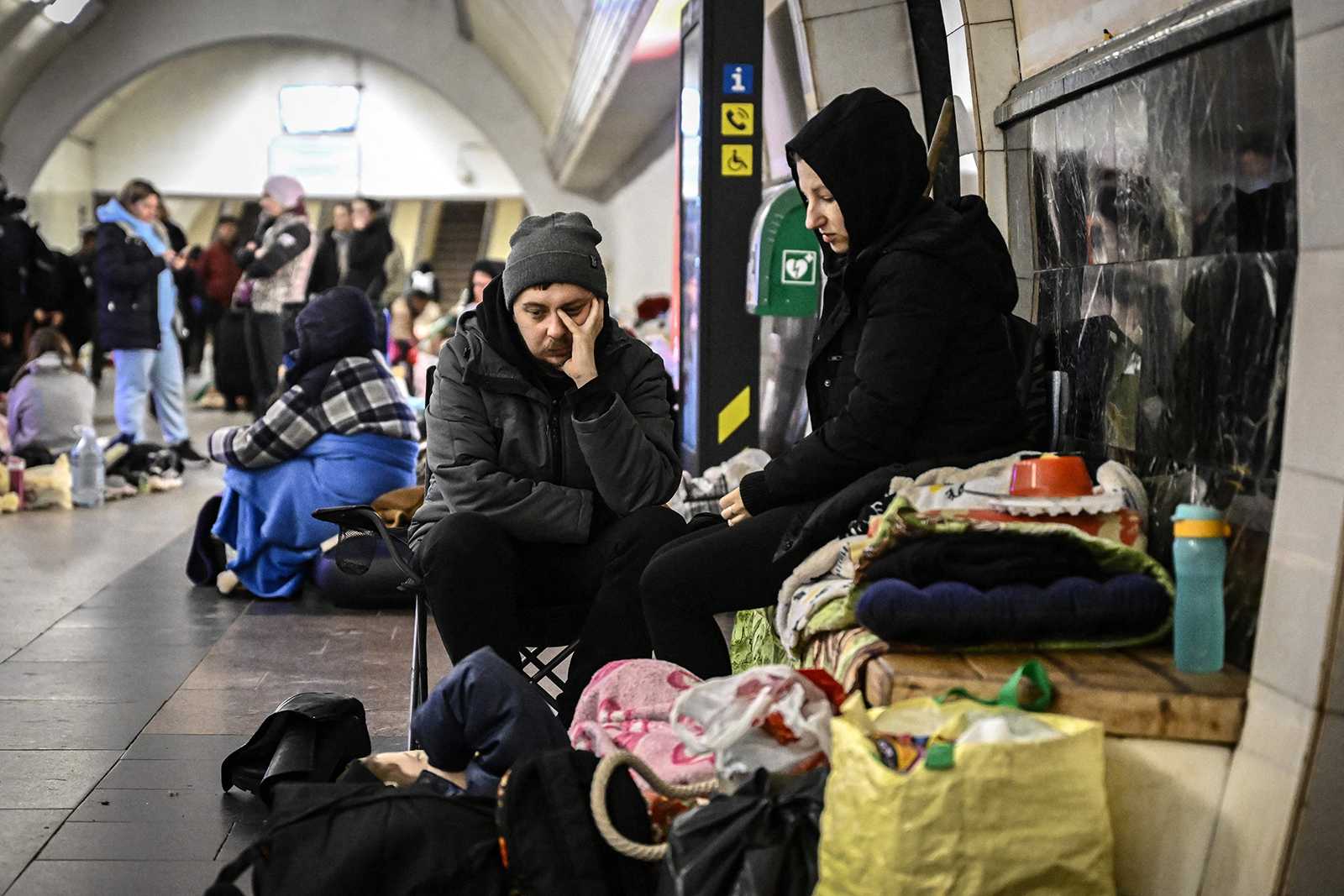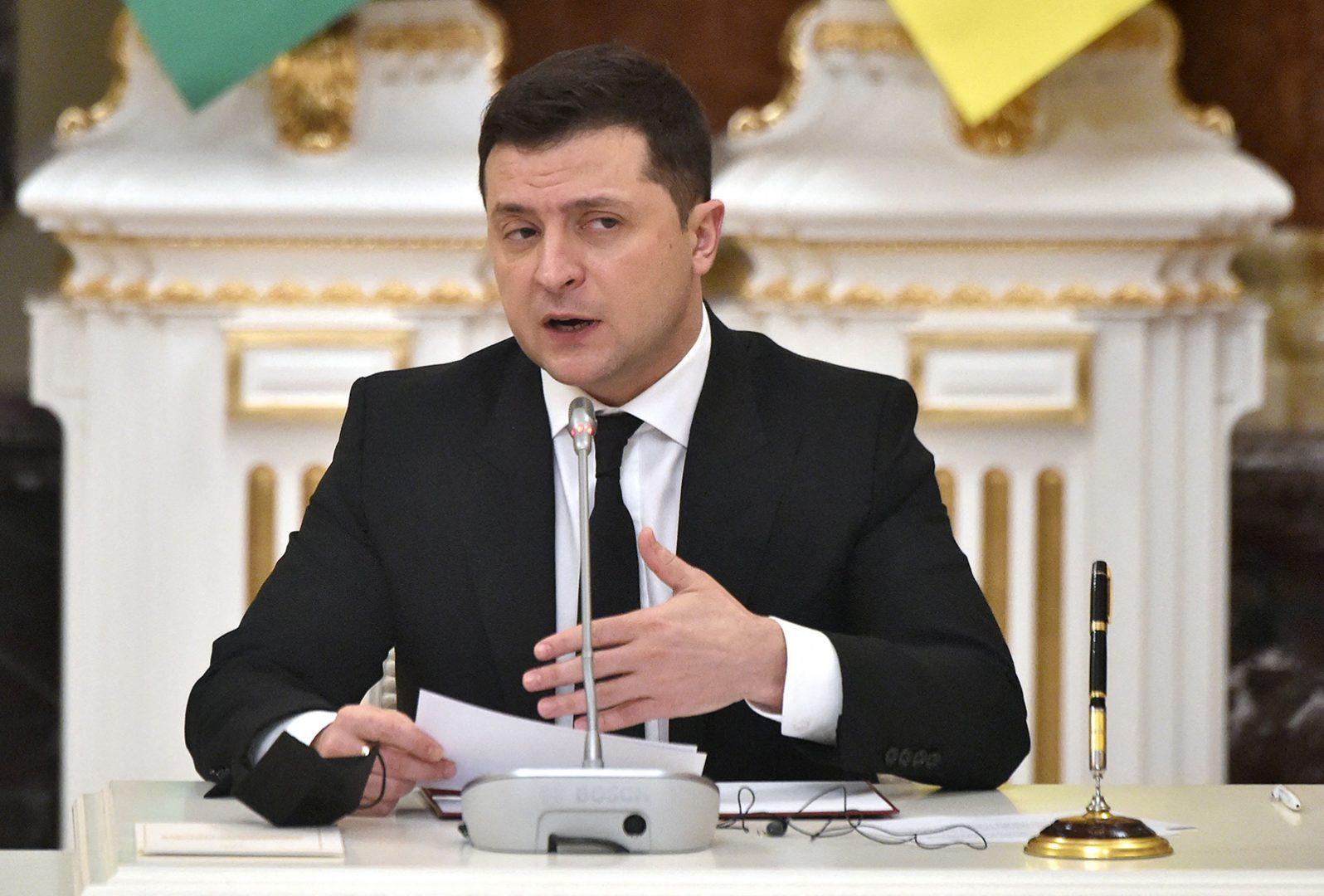Like millions of Ukrainians who have been impacted by the war between Russia and Ukraine, Fresno State political science professor Nataliia Kasianenko said she hasn’t slept in the past several days since Russia invaded Ukraine on Thursday, Feb. 24.
She was born and raised in Kharkiv, Ukraine and has lived in the United States for the past 10 years, but her family and friends in Ukraine are in the midst of warfare.
“They are in different parts of Ukraine… where some of the fiercest battles are at the moment as [Russian] troops are advancing from the east and then from the south of the Black Sea,” Kasianenko said.
She said her parents were staying in an underground shelter and that the “silver lining” is that they’re still able to communicate with each other by messaging photos and news updates.
On Thursday morning, President Vladimir Putin of Russia launched an invasion of Ukraine, and Ukrainian president Volodymyr Zelenskyy declared martial law and officially broke diplomatic ties with Russia.
Kasianenko said even though she has studied Russia and Ukraine, has family in both places and has participated in seminars about the growing tension within Russian-Ukrainian borders, she was still in disbelief at Vladimir Putin’s actions.
Kasianenko received a degree in economics from the Kharkiv National University in Ukraine and holds a doctorate in political science from the University of Nevada, Reno. She also has published works for Nationalities Papers, Ethnopolitics, Ideology and Politics Journal and East/West: Journal of Ukrainian Studies.
She said her family was also in disbelief because they’re all Russian speakers, members of the Russian Orthodox church and have ties in Russia. An invasion from their neighboring country was a shock.
Kasianenko said her family members are all anxiously waiting because they have no idea what’s going to happen, and in the situation they’re currently in. “Uncertainty’s the worst,” she said,
“I don’t know. Maybe it’s the science element of this, that we are trying to think logically about the behavior of leaders. No one, really, could honestly predict that President Putin [would] engage in this attack… That there [would] be a full-scale invasion of an entire country,” Kasianenko said.
Victoria A. Malko, a history professor at the university, said this was Putin’s attempt to show “the might of the Russian military,” pointing out that the invasion happened the day after Russia celebrated “Red Army Day,” also known as the Defender of the Fatherland Day.
Malko received her bachelor’s at National Linguistic University in Kyiv, Ukraine, her master’s in history and linguistics at Fresno State and doctor of education at UC Davis. She is also a published author for her research on Russian and Ukrainian history, earning Fresno State’s Outstanding Thesis Award in 2004.
Malko said she is also deeply impacted by the war between Russia and Ukraine.
“It affects my immediate family. It affects my friends in Ukraine. I live with heartache every day,” Malko said.
Her father, 84, and mother, 82, are both in Kyiv, the capital of Ukraine. She noted how they live six miles away from the Antonov International Airport, where bombings led to the destruction of one of the world’s largest aircraft, Myria, meaning dream or “hope,” according to Malko.
“Putin is trying to deprive Ukrainians of their hope; of their basic rights to life, liberty and the pursuit of happiness. It’s dehumanizing on a grand scale,” Malko said.
She’s communicating with her father every day, also updating each other about the ongoing news of the conflict. Malko said her parents are in fear as they hear news about Ukrainian citizens being captured in buses as hostages to move Russian tanks forward.
Ukrainian ambassador to the U.S., Oksana Markarova, confirmed the country’s loss of Chernobyl, Zmiinyi Island — also known as Snake Island — and the dam of Kyiv, during a press conference on Feb. 26. Markarova also said that Ukraine suffered from marine attacks, aerial attacks and rocket launcher hits. Hospitals, schools, orphanages and residential areas have been destroyed as collateral damage.
Malko compared her parent’s experience to their past during World War II. Both of her parents were survivors when Nazi Germany occupied Ukraine. Her mother was orphaned after World War II and was raised by her aunt
“[My father] survived the German occupation. He remembers concentration camps, and now, he’s facing the Russian occupation. So it’s just incomprehensible… These are traumatic memories that we Ukrainians carry in our blood,” Malko said.
Malko’s nephew is still in Kyiv, and he is alone since his parents were able to escape to Slovakia. He’s fearful that Putin will use nuclear weapons and, according to Malko, asked, “Are we in World War III?”

Kasianenko said the trending topic of WWIII is being “overblown” on the American side because sending U.S. troops to Ukraine was “never on the table.”
She also shared her frustration with the lack of support because she knows the West can help in many other avenues.
Kasianenko acknowledged NATO, the European Union (EU) and U.S.’s support for Ukraine and pressure on Russia to deescalate the situation with troops in Russia before Feb. 24, but since Thursday’s invasion, she said her attitude has “completely changed.”
“I am angry. I am frustrated with the West — the lack of action. I am so tired of hearing things like ‘We are concerned.’ I’m so tired of hearing these statements of support,” Kasianenko said. “I’m so tired of seeing statements such as ‘We’re praying for Ukraine.’ Prayers are great. However, this is not what’s going to save lives in my country right now.”
She said western countries were too preoccupied with “economic matters” regarding energy, gas and oil while her friends in Ukraine are fighting for their country.
She said her friends are scared if Ukraine is still going to exist a week from now. They also have frustration with the West and hate to be treated as a buffer zone between Russia and NATO countries, Kasianenko added.
“This is not what Ukraine is. Ukraine is an independent state. It’s a European country. It’s a democratic country that wants its own independent, sovereign state future,” Kasianenko said.
Malko wrote letters to the United Nations, the U.S. Congress and President Joe Biden weeks before the invasion started, warning them about Russia and advocating for more action to be done. In the letters, she wanted to speed up the process of sanctions against Russia, aid in military support and remove Russia from the United Nations Security Council.
After the invasion happened, Malko said there needs to be a “visible act” of retaliation from NATO and the U.S., trying to charge Putin for a case of genocide in the International Court of Justice.
“I sometimes feel frustrated that things move so slowly, and there’s enough evidence for that trial in the International Court of Justice to start immediately,” Malko said.
On Monday morning, Ukraine filed a genocide case against Russia in the international courts.
“Sanctions do not deter [Russia]. That’s fairly clear, but they do punish… short of going to war, short of actually sending in troops to defend the Ukrainians. Europe and the United States don’t have much they can do,” John P. Farrell, Fresno State history professor, said.
Farrell said that’s the problem when dealing with international policies: It’s difficult to stop a leader who actually does extreme things like what Putin is doing.
Farrell has been teaching 20th-century Russia for years, receiving his doctorate in European history with an emphasis on Russia in 2004 from UC Davis. Farrell has taught at Fresno State for 22 years and taught for five years at Fresno City College. He also lived in Moscow for a year in 1999 and was there when Putin was appointed prime minister.
“[Putin’s] got a kind of a long history of doing things, not only with reverence of his own people and the opposition but essential foreign countries,” Farrell said.
“I’m capable of saying, ‘Well, I guess I was surprised [of Russia’s invasion],’ but it’s also consistent with his behavior over the last 20 years,” he said.
Farrell said Putin has grievances against the West, Europe, NATO and the EU “speaking as though he speaks for all the Russian people.”
He acknowledged Putin’s argument that Russia was “dismayed” after the fall of the Soviet Union, but he noted that the action of his grievances is not justifiable. As a historian, Farrell said he knows how Putin has been “abusing Russian history.”
“[Putin’s] embellishing it, changing it, engaging in his own big lie so to speak and essentially spinning what would be a kind of stab-in-the-back theory,” Farrell said.
Malko said Putin is justifying his actions through Russian propaganda based on Vladimir Lenin and Joseph Stalin’s ideals. Putin is “revising” the past to neglect Russia’s negative history on Ukraine, according to Malko.
“Russian citizens, they live in a bubble where their consciousness and all the information is strictly controlled by the government,” Malko said.
Malko has published research on Russian history in Ukraine in “Women and the Holodomor-Genocide: Victims, Survivors, Perpetrators,” talking about how millions of Ukrainians died of famine under the Soviet Union.
Holodomor was recognized as a genocide of Ukrainians, and 70% of Ukrainian “intelligentsia” or highly educated class, 30% of teachers and 25% of farmers died. Malko said books talking about Holodomor were removed in Moscow and humanitarian research organizations in Russia investigating the genocide were shut down.
“Putin is not interested in money. He’s only interested in power… He’s also interested in restoring what he considered to be the greatness of Russia,” Farrell said.
Kasianenko acknowledged that not all of Russia believes in the propaganda, and praised the “bravery” of Russian citizens who have protested against the invasion.
In Russia, protests are categorized as a crime if more than two people gather, and people can be jailed, Kasianenko said. She also said there is a part of the Russian population that does support this invasion and believes Putin’s narrative.
Another Putin narrative Kasianenko wanted to refute was the belief that Ukraine is being ruled by a Neo-Nazi government.
“[This belief] is completely ridiculous, but some people do believe that [Ukraine] has extreme nationalist government in place that discriminates against ethnic groups. It doesn’t make any sense,” Kasianenko said.
Kasianenko said she sees misinformation in the West as the Russia Today Channel, a state-controlled international television network, is still being broadcasted in western states, spilling propaganda.
“I’ve been hearing awful things like that President Putin should be praised for his leadership, for his decisive action in basically maintaining and capturing control,” Kasianenko said.
“I mean, these praises are harmful, considering what is actually happening and how many people are losing their lives, innocent people, because of the actions of literally this one man.”
These Fresno State professors said Americans and the Fresno State community should be more aware of the history not only because it impacts the families of the faculty here, but also to avoid the misinformation being spread and realize it affects everyone.
“This is a military conflict, a war in the middle of Europe, we haven’t seen since essentially World War II… So the entire world, including the Fresno community, should be paying attention,” Kasianenko said.
“Liberal democracy might have to be defended… This isn’t just an attack on Ukraine. It’s an attack on free people everywhere,” Farrell said.




